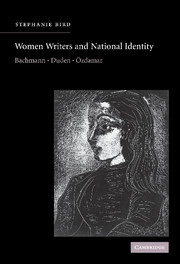Book contents
- Frontmatter
- Contents
- Acknowledgements
- Introduction
- PART I INGEBORG BACHMANN: THE TODESARTEN PROSE
- 1 Franza and the Righteous Servant
- 2 On sharks and shame
- 3 Malina: experience and feminism
- PART II ANNE DUDEN: THE SUFFERING BODY
- PART III EMINE ÖZDAMAR: PERFORMANCE AND METAPHOR
- Conclusion: das war es
- Notes
- Bibliography
- Index
1 - Franza and the Righteous Servant
Published online by Cambridge University Press: 22 September 2009
- Frontmatter
- Contents
- Acknowledgements
- Introduction
- PART I INGEBORG BACHMANN: THE TODESARTEN PROSE
- 1 Franza and the Righteous Servant
- 2 On sharks and shame
- 3 Malina: experience and feminism
- PART II ANNE DUDEN: THE SUFFERING BODY
- PART III EMINE ÖZDAMAR: PERFORMANCE AND METAPHOR
- Conclusion: das war es
- Notes
- Bibliography
- Index
Summary
In her recently published introduction to Ingeborg Bachmann, Stefanie Golisch quotes Christa Wolf's comment on Bachmann's relationship to her protagonists in the fourth Frankfurt lecture: ‘Die Bachmann aber ist jene namenlose Frau aus Malina, sie ist jene Franza aus dem Romanfragment, die ihre Geschichte einfach nicht in den Griff, nicht in die Form kriegt.’ (Yet Bachmann is that nameless woman in Malina, she is the Franza of the unfinished novel who simply does not get her story in hand, cannot give it form.) Although Golisch admits that the ability of an artist to attain a reflexive distance from his or her experience when incorporated into their work is not dependent on the sex of the author but is ‘eine Frage der psychischen Disposition einer kreativen Natur’ (a question of the psychological disposition of a creative personality), she nevertheless argues that Wolf is pointing in the right direction:
Es ist für Schriftstellerinnen offenbar bis in die Gegenwart hinein schwieriger als für ihre männlichen Kollegen, jenen überlegenen Blickwinkel einzunehmen, der ihre Werke erst aus der Befangenheit der eigenen Betroffenheit entließe und somit unanfechtbar machte.
(Until now it is clearly harder for female authors than their male colleagues to adopt an elevated perspective, such as would allow the works to escape the intense personal investment of their authors, thereby becoming unassailable.)
- Type
- Chapter
- Information
- Women Writers and National IdentityBachmann, Duden, Özdamar, pp. 13 - 38Publisher: Cambridge University PressPrint publication year: 2003



